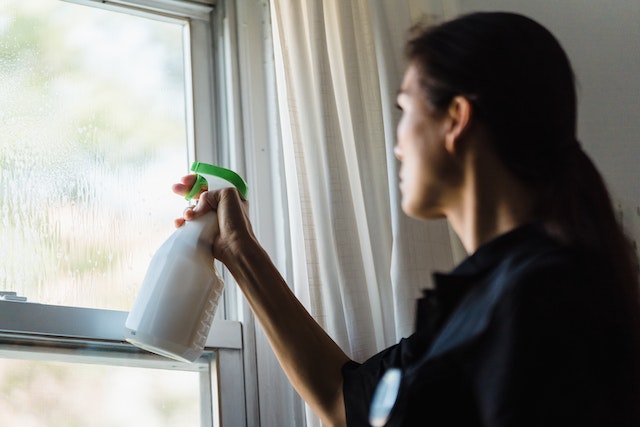
Unwanted guests in your home can be a nuisance, especially when dealing with silverfish. If you’ve discovered these elusive creatures skittering around your space, you’re not alone.
In this comprehensive guide, we’re diving into the world of silverfish and exploring an essential aspect of their control – silverfish sprays. Whether you’re dealing with a minor infestation or aiming to prevent these pests from invading your living spaces, we have a spray for silverfish to solve your problem!
Silverfish in Your Home
Silverfish are small, wingless insects known for their silvery-gray color and distinctive, carrot-shaped bodies. They are commonly found indoors and are often considered pests due to their feeding habits. Here’s how silverfish typically get indoors and what they may do indoors:
Entry Points
- Silverfish can enter buildings through small cracks and crevices in walls, foundations, and window frames.
- They may also enter through gaps around doors, vents, and utility lines (such as pipes and wiring).
- Sometimes, silverfish are unknowingly brought into homes through infested items like books, cardboard boxes, or stored clothing.
Ideal Conditions
Silverfish prefer dark, damp, and humid environments, commonly found in bathrooms, basements, kitchens, and laundry rooms. They are nocturnal creatures, so they are more active at night and tend to hide during the day.
Feeding Habits
Silverfish are primarily herbivorous, feeding on a variety of carbohydrates and proteins. They are known to consume items such as:
- Starches: Paper, wallpaper, cardboard, and glue.
- Fabrics: Cotton, linen, silk, and synthetic materials.
- Food: They may infest pantry items like flour, cereal, and dried pasta.
They can cause damage to books, essential documents, and clothing when they feed on these materials.
Lifespan and Reproduction
- Silverfish have a relatively long lifespan for an insect, typically living for two to eight years.
- They reproduce by laying small clusters of eggs in cracks and crevices.
- The eggs hatch into nymphs, which resemble smaller, white versions of adult silverfish.
Pest Control
To control silverfish infestations, reducing moisture levels in your home by using dehumidifiers and fixing any leaks is important.
- Store food items in airtight containers to prevent infestations in the kitchen and pantry.
- Seal cracks and gaps in your home to limit their entry points.
- Use insecticides, traps, or a spray for silverfish if the infestation is severe.
Silverfish are not uncommon in North Carolina, especially in areas with high humidity and moisture, as these conditions are favorable for their survival. Being part of the state’s humid subtropical climate zone, Raleigh can provide suitable habitats for silverfish.
Consider local conditions and trends to determine the extent of the silverfish problem in Raleigh and its surrounding areas. Silverfish thrive in damp and dark environments, so homes or buildings with moisture issues, like basements, bathrooms, and kitchens, may be more prone to infestations.
If you suspect a silverfish problem in your area or property, it’s advisable to consult with a local pest control professional like us at Innovative Pest Solutions. We can assess the situation and provide tailored solutions to address infestations effectively.
Creating Your Spray for Silverfish
Want a quick and easy solution to your infestation? Try a spray for silverfish problems; our tips can help reclaim your space in no time!
Vinegar Spray

A vinegar spray for silverfish is an effective and readily available DIY solution for dealing with these pests. Vinegar, particularly white vinegar, can be helpful due to its strong odor and acid content. Here’s how you can create and use a vinegar spray:
Ingredients: Mix equal parts of white vinegar and water in a spray bottle to make a vinegar spray. This combination provides the right balance of potency and coverage.
Application: Once you’ve prepared the solution, apply it generously in areas where silverfish are frequently seen or suspected, such as in basements, bathrooms, kitchens, and around cracks and crevices where they may enter your home.
Odor Deterrent: Silverfish dislike the pungent odor of vinegar, which can disrupt their movement and make your home less appealing. The acetic acid in vinegar can also affect their sensory perception.
Repeat as Needed: For the best results, you may need to reapply the vinegar spray periodically, especially in areas prone to moisture, as the effectiveness of the scent may diminish over time.
However, remember that vinegar shouldn’t be your only line of defense against silverfish. You’ll need regular pest maintenance to keep these pests at bay.
Cinnamon Spray

Cinnamon is another natural remedy to deter silverfish. It has a pleasant aroma for humans but is unappealing to these pests. Here’s a more detailed guide on creating and using a cinnamon spray for silverfish:
Cinnamon Infusion: Begin by boiling a few cinnamon sticks in water. Allow the mixture to simmer for a while to infuse the water with the scent of cinnamon. Let the liquid cool.
Straining and Bottling: After steeping, strain the cinnamon-infused water and pour the filtered liquid into a spray bottle.
Application: Use this cinnamon-infused water as a spray in active silverfish areas. Pay special attention to cracks, crevices, and baseboards where silverfish tend to hide.
Odor Repellent: Silverfish are repelled by cinnamon scent, making it an effective natural spray to discourage them from staying in your living spaces.
Reapply When Necessary: Similar to the vinegar spray, the effectiveness of the cinnamon scent may diminish over time, so reapplication may be needed to maintain its deterrent effect.
Citrus Peel Spray

Citrus peels repel silverfish naturally. Here’s how to make citrus peel spray for silverfish:
Citrus Infusion: Collect citrus peels from fruits like oranges or lemons. Place the peels in a container with water and allow them to steep for several days, allowing the water to absorb the citrus aroma.
Straining and Bottling: After the steeping period, strain the liquid to remove the citrus peels, ensuring a clear, citrus-infused liquid. Transfer this liquid into a spray bottle.
Application: Use the citrus-infused water as a spray for silverfish in areas where these pests are active or suspected. Apply it along baseboards, in dark corners, and near entry points.
Citrus Scent Repellent: Silverfish find the scent of citrus unattractive, and spraying this solution in their habitat can discourage them from staying or moving around.
Regular Maintenance: Just like the previous sprays, the effectiveness of citrus peel spray may decline over time, so be prepared to reapply it as needed to maintain its potency.
Spray for Silverfish: Limitations & Need for Pest Control
While these DIY solutions can be adequate for preventing mild infestations, remember that they may not eliminate a severe infestation. In such cases, consulting a professional pest control service may be necessary to address the issue more comprehensively.
Are you tired of battling pests in your Raleigh, North Carolina, home or business? While DIY solutions like vinegar, cinnamon, or citrus spray for silverfish can offer temporary relief, they often fall short when tackling severe infestations or preventing pests from returning.
Our expert professionals are here to provide you with a comprehensive, long-lasting solution. With years of experience and a deep understanding of the unique pest challenges in the Raleigh area, we offer tailored pest control services that go beyond DIY sprays and remedies.
Don’t let pests take over your space; trust Innovative Pest Solutions for effective, reliable, and environmentally responsible pest control. Contact us today to schedule your inspection and take the first step towards a pest-free environment.





